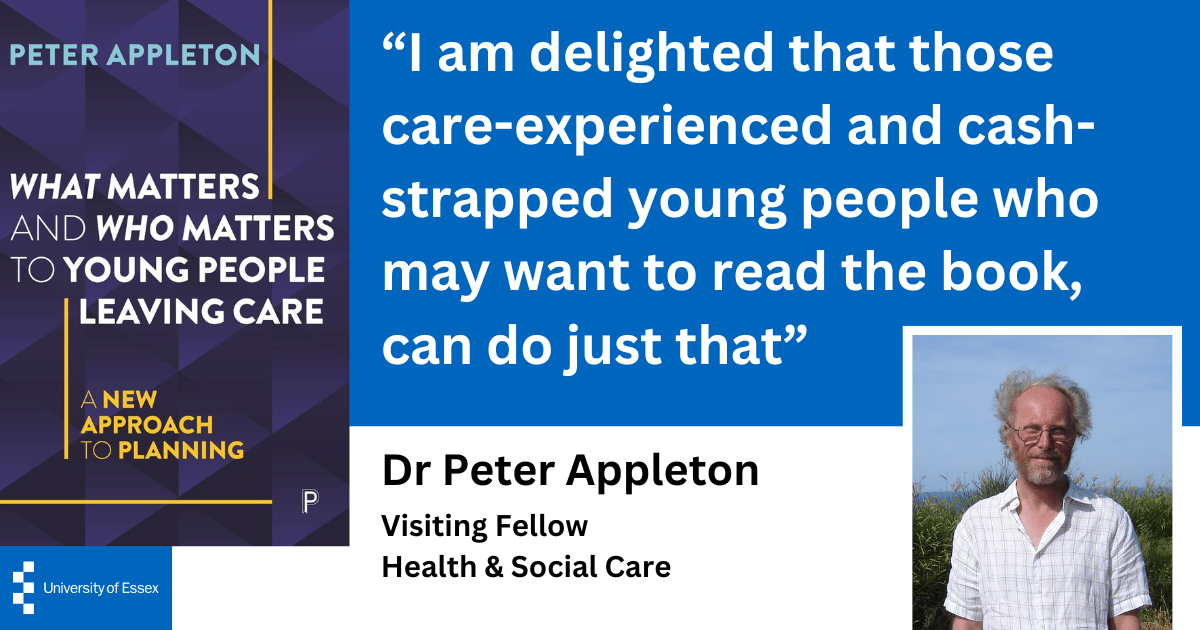Peter Appleton: Q&A on Open Access publication
.jpg?mh=1000&mw=1000&hash=A5E39753673EC4A17239E4906BFFF26D)
The Open Access (OA) team from the University of Essex's Library Services spoke to Dr Peter Appleton, Visiting Fellow in the School of Health and Social Care, about his new book What Matters and Who Matters to Young People Leaving Care: A New Approach to Planning (Bristol University Press, 2024).
Dr Appleton chose to make use of the University’s Open Access Fund to ensure that his new book would be available without restriction to readers everywhere.

OA - How does it feel to have it published and freely available?
PA - It does feel wonderful, thank you! Not only to have completed the book, and for it to be freely available via Open Access, but also to have published a series of papers about young adults transitioning from care (foster care, kinship care, residential care). Our two empirical studies with care-leavers were conducted at Essex University, with colleagues Dr Isabelle Hung and Dr Sagaradevi Barratt, and with the support of Professor Frances Blumenfeld, Dr Danny Taggart, and Professor Susan McPherson, at the School of Health and Social Care.
In one sense the work goes back to my PhD, at Liverpool University, in a Public Health and Epidemiology department in which social and health inequalities were a very strong departmental focus, starting me on a research route which eventually led to Essex University which has such a superb sense of openness to ideas which challenge orthodoxies. But see below for the particular stimulus for this work!
OA - Why is Open Access important to you and how do you think it will benefit your work?
PA - Hearing that Essex University would fully fund Open Access for this book transformed my sense of how the book might be received. I am delighted that those care-experienced and cash-strapped young people who may want to read the book, can do just that, quite apart from professionals in nascent multi-agency transition-from-care services, whose services may also be financially constrained!
OA - How did you find the Open Access process?
PA - Once funding became available, the Open Access team at the university worked very closely and efficiently with me and with the Commissioning Editor at Bristol University Press. Thank you.
OA - What advice about open access would you offer to colleagues?
PA - Open Access involves a ‘serious’ learning curve, but the benefits (all round) are potentially huge, so do jump in!
OA - How did the idea come up, and what are the key ideas?
PA - At quite a late stage in my NHS career I worked as a clinical psychologist in a multi-agency Youth Offending Team – many of the young people were in care as well as in the justice system. During my work in this team, I became acutely aware not only of the extraordinary mental health challenges of some young people’s ‘double whammy’ of being in care (usually due to previous maltreatment) and in the justice system, but also the young peoples’ wishes to be much more actively involved in decisions that would affect their futures. This became a focus.
I started reading about the sociology of the interplay between agency and structure. I discovered the ground-breaking work of Professor Margaret Archer and went to see her at Warwick University in 2009. Her theoretical ideas (including the central importance, in her theoretical framework, of internal conversations), and her extended and programmatic qualitative research, provided a working model for our two Essex research studies with care-leavers.
The first two chapters of What Matters provide an in-depth discussion of Archer’s theoretical model as it applies to young people in transition from care, many of whom are living with compounded adversity. Although we have questioned her typology of reflexivity (especially ‘fractured reflexivity’) I use the space of the book to hold onto, and develop, Archer’s extraordinary insights about reflexivity and dialectical engagement with social worlds during emerging adulthood.
By using the qualitative interview that Margaret Archer developed we found that some young people in transition from care did not wish to plan for the future but did have richly detailed accounts of what and who was important in their lives, and equally intense accounts of the importance of social / shared deliberations with friends and family, despite the histories of interpersonal trauma.
A three aspects model of planning emerged, based not only on Archer’s work, but also on the ground-breaking work of philosopher Michael Bratman (and radical critiques of Bratman’s model).
There are detailed qualitative analyses in the book of care-leaver’s narratives about each of the proposed three aspects of planning: (1) what and who matters (for example, my family matters), (2) shared deliberation and shared planning (for instance with friends, family, professionals), and (3) a sense of personal time – each participant discussing a unique and complex framework of ‘mental time travel’.
The book suggests that each aspect of young people’s planning may be regarded as a potential strength, based on reflexive lived experience, in contrast to the idea that ‘lack of future orientation’ might be regarded as a vulnerability.
The starting point for this research - of noting minoritised young peoples’ wishes to be much more actively involved in decisions that would affect their futures - has, as a result of the qualitative research programme at Essex, differentiated out into a three-aspects model, or, in terms of potential service co-design and co-production, at least three ‘creative spaces’ for discussion with care-experienced young people (and potentially with young people in the justice system – research yet to be done!).
OA - What’s next for you? Do you have any new projects lined up?
PA - In a kind of sympathy with some of the young people we interviewed, I think I’ll pass on the future orientation part of planning 😊. Having said that, I am committed to continuing to write about young people leaving care, and have some ideas for discussion, especially across different disciplines, but with no specific timescale!
It has been amazing to gradually jump out of my original undergraduate training in psychology (but thank you Durham for the genuine breadth of the psychology), and immerse myself, as best as I can, in aspects of philosophy, sociology, social work, and in the last chapter of What Matters, critical geography. Thank you Essex, including the magical library (philosophy and sociology sections, for instance, second to none), for the chance to ‘take off’.
Bibliography
What Matters and Who Matters to Young People Leaving Care: A New Approach to Planning by Dr Peter Appleton (Bristol University Press, 2024).
The Open Access Fund
The University’s institutional Open Access Fund, managed by the Library's Research Support Team, enables Essex authors to publish as much research as possible open access. If you want to explore Open Access options please start by completing our enquiry form.




